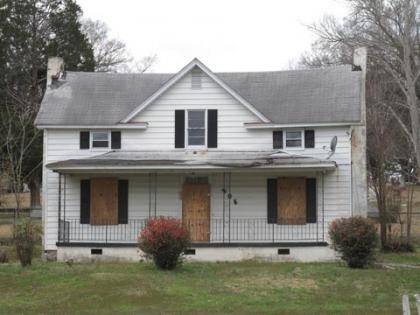Duke Project Joins Coalition to Purchase, Renovate Pauli Murray House
Durham childhood home of human rights activist to serve as educational and community center

The historic West End neighborhood home where noted
activist and human rights leader Pauli Murray was raised will be saved by a coalition
of city groups committed to honoring Murray's life.
Raised in a home built by her grandfather, Murray
went on to become a nationally recognized civil rights advocate and the first
African American woman ordained by the Episcopal Church.
"Durham can embrace Pauli Murray as a symbol of
our community's values and struggle for equality, dignity and justice," says
Barbara Lau, director of Duke's Pauli Murray Project. "Saving her childhood
home will help us bring new life to her message of addressing the hard
questions and bringing people together to work for justice."
A ceremony will be held 10 a.m. Tuesday, May 17, at the house at
906 Carroll St where representatives of the Pauli Murray Project, SW Central
Durham Quality of Life Project and Self-Help will announce plans to convert the
building, known as the Pauli Murray-Robert Fitzgerald house, into a site for
community dialogues, educational programs and social justice advocacy.
There will also be a tour of the home's interior.
Durham Mayor Bill Bell will speak, joined by
Barbara Lau, director of the Pauli Murray Project; Lew Myers, chair of the
Center for Community Self-Help Board of Directors; Charmaine McKissick-Melton,
daughter of civil rights activist Floyd McKissick Sr.; Alisa Johnson, from the
Southwest Central Durham Quality of Life Project steering committee; and
Reverend Dwyian Davis, a member of the Fitzgerald-Murray Family.
Murray was the first woman to
graduate at the top of her class from Howard Law School. She advised First Lady
Eleanor Roosevelt on civil rights and she co-founded the National Organization for Women. Before her death in
1985, Murray was the first African-American woman to be ordained as an
Episcopal priest and offered communion for the first time at the Chapel of the
Cross in Chapel Hill.
"As a long time Durham resident, I am proud
of our community's strong connection to Pauli Murray," says Lew Myers, chair of
the Center for Community Self-Help Board, a
community development lender that works with individuals, organizations and
communities traditionally underserved by conventional markets. "She was
well ahead of her time in advocating for women's rights and civil rights, and I
am excited that Self-Help is able to play a significant role in saving her
childhood home."
The home's builder, Murray's grandfather Robert
Fitzgerald, was a black man and Civil War veteran. He came south to teach newly
emancipated African Americans reading, writing and citizenship.
"To his family, it [the house he built] was more than a home; it was a monument to Grandfather's
courage and tenacity," Murray wrote in her 1956 memoir, "Proud Shoes: The
Story of An American Family." Blind by injuries during the war,
Fitzgerald supervised the laying of each board, brick and shingle by touch. "It
was as if he had built himself into the structure, for it had his stubborn
character."
The rehabilitation of the Pauli Murray-Robert
Fitzgerald house is a collaborative effort between the Pauli Murray Project, an
initiative of the Duke Human Rights Center; the Southwest Central Durham
Quality of Life Project, a six neighborhood community-based advocacy group; and
Self-Help with support from Preservation Durham and the College of Design at NC
State University.
In addition to fund-raising efforts, the project
is also supported by the creation of a special Pauli Murray Certificate of Deposit
at Self-Help Credit Union.